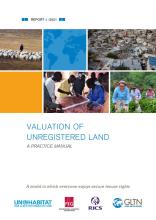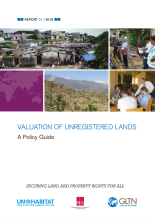Resources for Service providers
Training Manual - Working on Legitimacy in Land Governance
How state and customary authorities deal with land issues has important consequences for how they are viewed by citizens. This may be particularly the case in conflict-affected settings, where displacement and return cause tenure insecurity and land disputes, and where the legitimacy of state and non-state institutions is contested. ZOA and Radboud University have developed a training manual around legitimacy and land, based on research conducted by Radboud researchers in Uganda.
The training programme presented here helps development practitioners in the land sector to become more sensitive to questions of legitimacy, and to better understand how their interventions in the land sector impact local dynamics of legitimation.
Valuation of Unregistered Land – A Practice Manual
Value, and its attribution to unregistered land, is important information for effective land acquisition, taxation and transfer processes and a key component of land administration systems.
This manual presents a practical approach to the valuation of unregistered land. It is designed to aid implementation of Valuation of Unregistered Lands: A Policy Guide, prepared by the Global Land Tool Network for the United Nations Human Settlements Programme (UN-Habitat), in combination with the international valuation standards of the International Valuation Standards
Council. The manual comprises two parts. The first gives an overview of recommendations related to the valuation of unregistered land rights, and the second provides more detail about what to consider when working in this complex environment.
Valuation of Unregistered Lands: A Policy Guide
This guide aims to support the process of valuation of unregistered land and property for the public and private agencies that undertake this exercise. It will be relevant for policy makers, local authorities, international finance institutions, investors, property developers, banks, civil society organisations, citizens, land owners, local communities and women’s groups.




